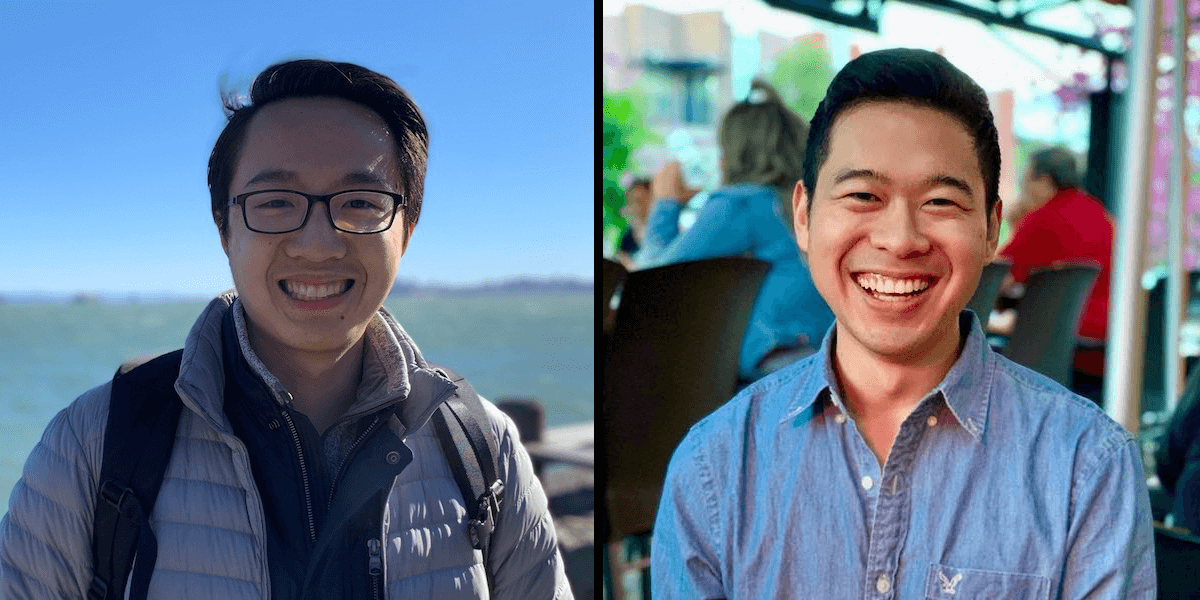
Bill Tang (L) and Nathan Justin (R) have been developing tools to aid the allocation of resources to unhoused people in Los Angeles. Images/Bill Tang and Nathan Justin
Two USC Viterbi students who are researching improved methods to allocate resources to the homeless have been awarded prestigious Graduate Research Fellowships from the National Science Foundation. Industrial and systems engineering Ph.D. student Bill (Yongpeng) Tang and computer science Ph.D. student Nathan Justin have been working under the supervision of WiSE Gabilan Assistant Professor of Industrial and Systems Engineering and Computer Science Phebe Vayanos.
The NSF GRFP recognizes and supports outstanding students in STEM disciplines who are pursuing research-based master’s and doctoral degrees. The five-year fellowship includes three years of financial support, including an annual stipend of $34,000.
USC Viterbi spoke to Tang and Justin to find out more about their work:
Name: Bill (Yongpeng) Tang
Hometown: Smithtown, New York
Degree/Major: Ph.D. Industrial and Systems Engineering
How does it feel to be the recipient of an NSF Graduate Research Fellowship?
I am both very elated and surprised that I was selected as a recipient of the NSF GRFP. I think it also shows there is support for the type of research I am interested in — work that has potential for social impact. I am also thankful for the advisors and mentors who helped guide me through the application process and my research experience so far.
What is your research about?
My research is on coming up with a policy for allocating housing for people experiencing homelessness in Los Angeles. Our goal is to have an optimal policy in terms of improving outcomes for individuals, while incorporating fairness requirements and being robust to things we cannot observe in a historical dataset.
What excites or inspires you most about your area of research?
The times that I found myself most excited are during meetings with actual decision makers and thinking about how to factor in real world constraints in our model. It is the tangible and application aspects of my research that I find most interesting
When did you first realize that you wanted to study engineering?
I would first say that I do not really think of myself as an engineer! During my undergrad, I knew I wanted to do something technical but still applied (as opposed to theoretical). I decided to study Industrial Engineering and Operations Research almost by process of elimination since I was not interested in other types of engineering. I became very interested in the combination of optimization and probability within “Industrial Engineering” towards real world applications, which is how I ended up where I am at now.
Name: Nathan Justin
Hometown: Upland, California
Degree/major: Ph.D. Computer Science
How does it feel to be the recipient of an NSF Graduate Research Fellowship?
I feel truly grateful for being awarded the NSF GRF. I could not have done it without the support of all those who have guided me academically and personally at USC, Harvey Mudd College (my undergraduate institution), and my hometown in Upland, California. With this fellowship, I’m so excited for what’s to come in my future research endeavors.
What is your research about?
Overall, I am interested in using optimization to build data-driven decision-making tools in high-stakes settings, focusing on decision trees.
One application that I am considering in my work is how we can better allocate housing resources to people experiencing homelessness in Los Angeles. We’re trying to inform an allocation policy in which an interpretable model (i.e., a decision tree) can be simply implemented by social workers and can be trusted by the general public.
However, in many applications like the housing allocation problem, the data used for training a model may look different than that at deployment. For example, surveys evolve with new recommended practices, and this affects how respondents answer questions over time. And so, if a model is not robust enough to adapt to this difference in the data, the deployed model can perform poorly and create unintentional harms and consequences. On top of this problem, there are often underlying issues of fairness among different demographics like race, age, and sexual orientation in existing policies that our models seek to avoid. With these complicating factors in mind, I plan on developing interpretable, robust, and fair decision tree models adaptable to many high-stakes domains like the housing allocation problem.
What excites or inspires you most about your area of research?
As an undergraduate, I became interested in developing mathematical foundations and working on theory, while also having a passion for community outreach and social good applications. My research combines these two worlds that are often seen as disjointed. While much of my work involves theory and mathematical modeling, all of it is motivated by important, real-world needs. The idea that my work can help society find new ways to address issues such as the housing crisis and racial injustice inspires me to keep going.
When did you first realize that you wanted to study engineering?
I have always had a love for mathematics, and it is still my primary passion today. For me, computer science was something that I grew to love early in my undergraduate career, especially as I realized its interconnections with mathematics. I am not an “engineer” in the traditional sense of building physical things in labs, but I have grown an interest for engineering through computer science in the sense that I want to build decision making tools to help solve important social problems.
Published on April 28th, 2022
Last updated on April 28th, 2022











